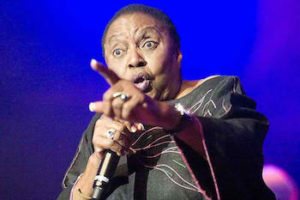
Miriam Makeba
*Mirriam Makeba was born on this date in 1932. She was a South African singer, entertainer, and activist.
From Prospect, South Africa, throughout her life and singing career, Miriam Zenzi Makeba has used her voice to draw the world's attention to the music of South Africa and its oppressive system of racial separation and apartheid. She attended the Kilmerton Training School in Pretoria for eight years, where she sang in the school choir. During her teenage years, Makeba helped her mother with the domestic work she did for white families.
She also pursued singing and, in 1950, joined an amateur Johannesburg group called the Cuban Brothers. In 1954, a successful professional South African group, the Black Manhattan Brothers, noticed her. Eventually, she left with the group in 1957 to become a member of a touring revue show, African Jazz and Variety. With her appearance in the semi-documentary antiapartheid film Come Back, Africa 1959, Makeba drew the attention of international audiences. That same year, Makeba traveled to London, where she met African American performer and civil rights activist Harry Belafonte, who had requested a private film screening.
Belafonte became her sponsor and promoter in the United States. Through him, she appeared on the Steve Allen Show, which led to nightclubs around New York City and recordings of South African music. Some songs became hits in the United States, including Patha Patha, Malaika, and The Click Song. Her music also contained a political component, the denunciation of Apartheid, which earned Makeba the hostility of the South African government, which revoked her passport when she attempted to return for her mother’s funeral in 1960. Makeba pressed on, and in 1963, she addressed a United Nations special committee on apartheid, characterizing South Africa as "a nightmare of police brutality and government terrorism."
Her marriage to African American civil rights activist Stokely Carmichael (aka Kwame Ture) derailed her career in the United States. The entertainment industry virtually blacklisted Makeba. According to one account, her record company never called her to record again after the marriage. She and Carmichael eventually moved to Guinea in West Africa. Makeba’s career continued outside of the United States; however, during the 1970s and 1980s, she toured Europe, South America, and Africa, appearing regularly at the Montreux Jazz Festival, the Berlin Jazz Festival, and the Northsea Jazz Festival.
In 1977, she traveled to Lagos, Nigeria, as the unofficial South African representative at Festac, a Pan-African arts and culture festival. In 1982, "Mother Africa," as she was known, reunited with South African trumpeter Hugh Masekela, to whom Makeba was married from 1964 to 1966. Continuing her activism, in 1975, she served a term as a United Nations delegate from Guinea. In addition, she was awarded the Dag Hammarskjöld Peace Prize in 1986. In 1987, Makeba performed on Paul Simon’s Graceland tour. She finally returned to South Africa in 1990.
In 1991, she released Eyes on Tomorrow, and that same year, Makeba gave her first live performance in South Africa since her departure more than 30 years earlier. She continued to record and tour.
In November 2008, South Africa’s top female singer, Miriam Makeba, died after being taken ill near the Southern Italian town of Caserta following a concert.
ASCAP Biographical Dictionary
R. R. Bowker Co., Copyright 1980
ISBN 0-8351-1283-1